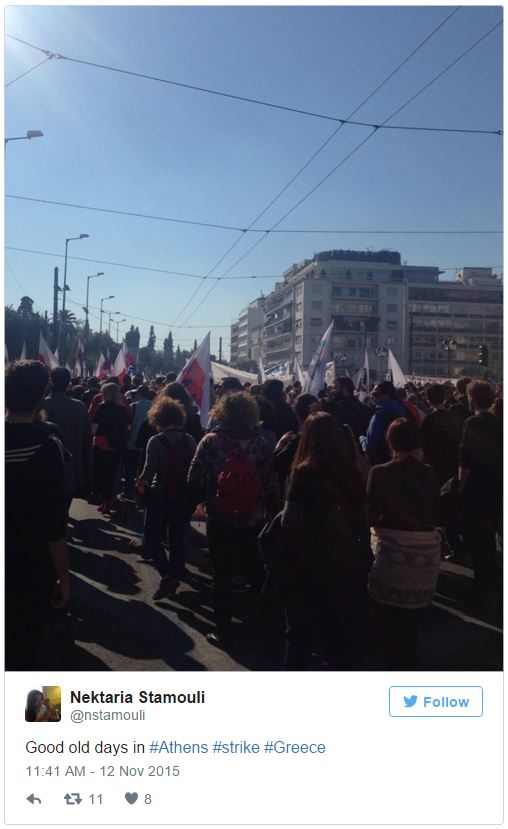Civil Unrest?
One thing that became abundantly clear after Alexis Tsipras sold out the Greek referendum “no” back in the summer after a weekend of “mental waterboarding” in Brussels was that the public’s perception of the once “revolutionary” leader would never be the same. And make no mistake, that’s exactly what Berlin, Brussels, and the IMF wanted.
By turning the screws on the Greek banking sector and bringing the country to the brink of ruin, the troika indicated its willingness to “punish” recalcitrant politicians who pursue anti-austerity policies. On the one hand, countries have an obligation to pay back what they owe, but on the other, the subversion of the democratic process by using the purse string to effect political change is a rather disconcerting phenomenon and we expect we’ll see it again with regard to the Socialists in Portugal.
After a month of infighting within Syriza Tsipras did manage to consolidate the party and win a snap election but he’s not the man he was – or at least not outwardly. He’s obligated to still to the draconian terms of the bailout and that means he is a shadow of his former self ideologically. As we’ve said before, that doesn’t bode well for societal stability.
On Thursday, we get the first shot across the social upheaval bow as the same voters who once came out in force to champion Tsipras and Syriza are staging massive protests and walkouts. Here’s Bloomberg:
As Greek workers took to the streets in protest on Thursday, Alexis Tsipras was for the first time on the other side of the divide.
Unions — a key support base for the prime minister’s Syriza party — chanted in rallies held in Athens the same slogans Tsipras once used against opponents. Doctors and pharmacists joined port workers, civil servants and Athens metro staff in Greece’s first general strike since he took office in January, bringing the country to a standstill for 24 hours.
Greece’s biggest unions, ADEDY and GSEE, are holding marches accusing Tsipras of bowing to creditors and imposing measures that “perpetuate the dark ages for workers,” as the country’s statistical agency released data showing that 1.18 million Greeks, or 24.6 percent of the workforce, remained unemployed in August.
The former firebrand opponent of bailouts was catapulted to power this year on a promise to end austerity, only to capitulate to creditors’ demands after the freezing of aid from the euro area brought the country’s financial system to the brink of collapse, forcing Tsipras to impose capital controls.
Even more belt-tightening will be required before Europe’s most indebted state gains access to additional emergency loans to cover its budget needs next year, and creditors agree to ease its debt burden. The GSEE union of private sector workers says those measures will bring “punitive austerity, poverty and impoverishment,” to a country where a quarter of the workforce is already without a job.
“There’s a risk of social explosion, as pension cuts and tax hikes loom,” said Sotiria Theodoropoulou, a senior researcher at the European Trade Union Institute in Brussels. “Last summer’s shock took a toll on many sectors, and it’s difficult to see where growth will come from.”
Amusingly, Syriza supports the strikes against its own policies (via The Telegraph):
The party’s department that deals with labor policy called for mass participation in the walk-out to protest “the neoliberal policies and the blackmail from financial and political centers within and outside Greece.”
And more from The Guardian:
Schools, hospitals, banks, museums, archaeological sites, pharmacies and public services will all be hit by the 24-hour walkout. Flights will also be disrupted, ferries stuck in ports and news broadcasts stopped as staff walk off the job.
“We are expecting a huge turnout,” Petros Constantinou, a prominent member of the anti-capitalist left group Antarsya told the Guardian. “This is a government under dual pressure from creditors above and the people below and our rage will be relentless. It will know no bounds.”
“Syriza may now be trying to save its soul but it has gone back on all its promises,” said Kalomoiris, a life-long leftist who joined a rebel group, Popular Unity, formed by Syriza dissidents when Tsipras signed up to the bailout in July.
“In this country a graduate starts off in the public sector with a salary of €775 a month, or €9,300 a year, and we are being told that wages will be frozen for the next decade and that every tax imaginable will be increased. How will people make ends meet? It has got to the point where a social explosion is inevitable and it will come sooner rather than later.”
Finally, from CBC:
Greek workers stayed at home on Thursday to protest austerity measures, in the biggest domestic challenge to Alexis Tsipras’s government since he was re-elected in September on a promise to cushion the impact of years of economic hardship.
Public transport was severely disrupted Thursday, with the Athens metro not running, bus and trolley routes reduced and ferries tied up in port. The strike shut down museums, schools and pharmacies, while state hospitals were functioning with emergency staff.
More than a dozen domestic flights were cancelled, while journalists also walked off the job, pulling news bulletins off the air except to report strike news.
Here, apparently, is what the beginning of a “social explosion” looks like:






So we suppose the lesson here for the troika is that you may be able to subvert the will of the people in the short term by forcing democratically elected officials to choose between their election mandate and financial ruin/depression, but that only serves to enrage an electorate that clearly was already fed up in the first place.
Obviously, this is decidedly untenable scenario and if there is indeed a rash of massive protests that causes public (and private) services to go dark for days at a time, something will have to change politically and that, in turn, sets the stage for yet another showdown with the troika. Case in point… here’s the Belgian finance minister’s response:
And last but not least, the latest jobs data for the country is out on Thursday. Unemployment is still exceptionally high, coming in at 24.6% in August with youth unemployment hovering near 50%:
Reprinted with permission from Zero Hedge.
The post Civil Unrest? appeared first on LewRockwell.




Leave a Reply